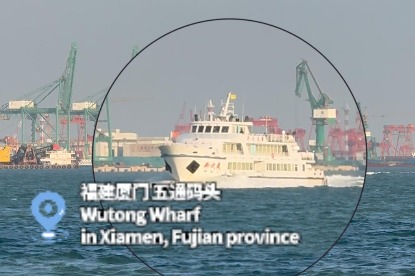Crucial stabilizer of global supply chains: China Daily editorial
chinadaily.com.cn | Updated: 2023-07-12 19:46

China's announcement last week that it will impose export controls on germanium and gallium — two raw materials that are used in a wide variety of products including computer chips and solar panels — should be beyond reproach, given that controls on exports are a customary international practice.
Yet the step China has taken has drawn strong opposition from the United States which, out of ulterior motives, is deliberately misportraying the move as being disruptive to the global supply chains.
A US Commerce Department spokesperson saying that the US will engage with its allies "to address this (problem) and to build resilience in critical supply chains" is an ironical case of a thief crying "stop thief", because no other country has inflicted such huge damage on the global supply chains as the US, not least through the wanton restrictions it has imposed on supplying China with advanced memory chips and chip-making equipment. In its latest move, the US government is reportedly preparing to restrict Chinese companies' access to US cloud-computing services, by requiring cloud-service providers such as Amazon and Microsoft to seek the US government's permission before providing services to Chinese customers.
Although Chinese companies are the main suppliers of the two metals, there are other suppliers in Japan, the Republic of Korea, Europe and the US that also provide the materials. The Chinese authorities are just requiring that the Chinese suppliers get approval before exporting certain products that might be employed in ways that threaten the country's security. It is the US' weaponizing of such a practice targeting China that is rattling global supply chains.
China, despite all the claims to the contrary, has always worked to safeguard the global supply chains, which have become more vulnerable nowadays due to the Russia-Ukraine conflict, high inflation worldwide, and soaring global commodity prices. For years, the country has been a stabilizing force for the global supply chains, through its robust trade with other countries, as well as its manufacturing prowess that has enabled it to provide the bulk of components, raw and processed materials, to manufacturers globally.
Those who worry about China's "fair, reasonable and non-discriminatory" rules on germanium and gallium, that will come into effect on Aug 1, ignore the fact that they will have a limited impact on global supply given their targeted scope. Under the new rules, exporters in China only need to get approval from the authorities for exports of eight gallium and six germanium products. Some Chinese producers and their foreign customers have reportedly already started to apply for the permits.
In today's interdependent world, countries must work together to make the global supply chains secure and stable. Confrontational sanctions and protectionist policies, such as those loved and abused by the US, serve no good.
























